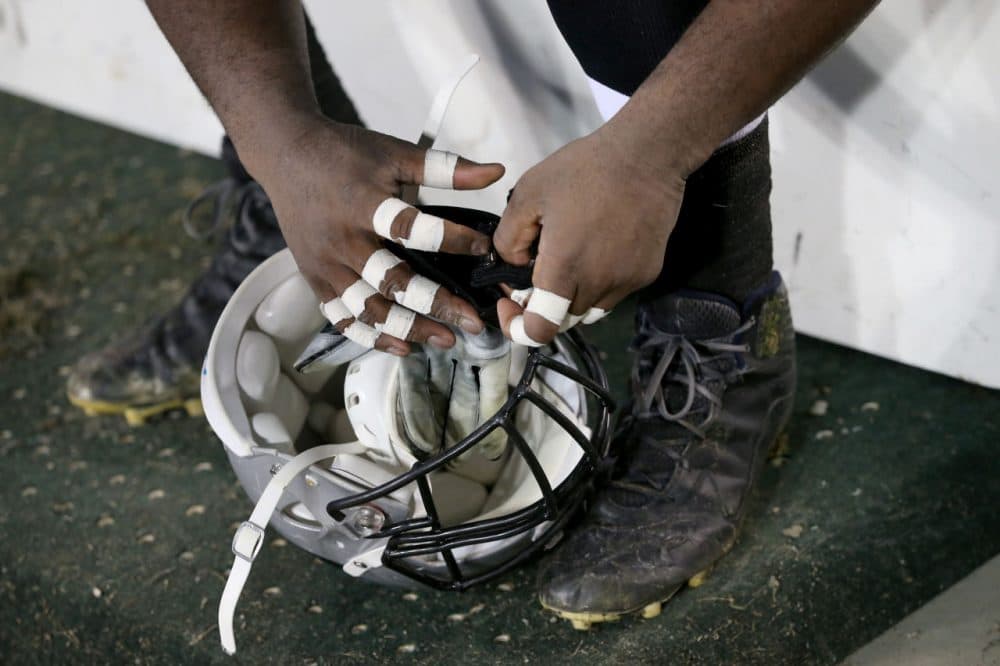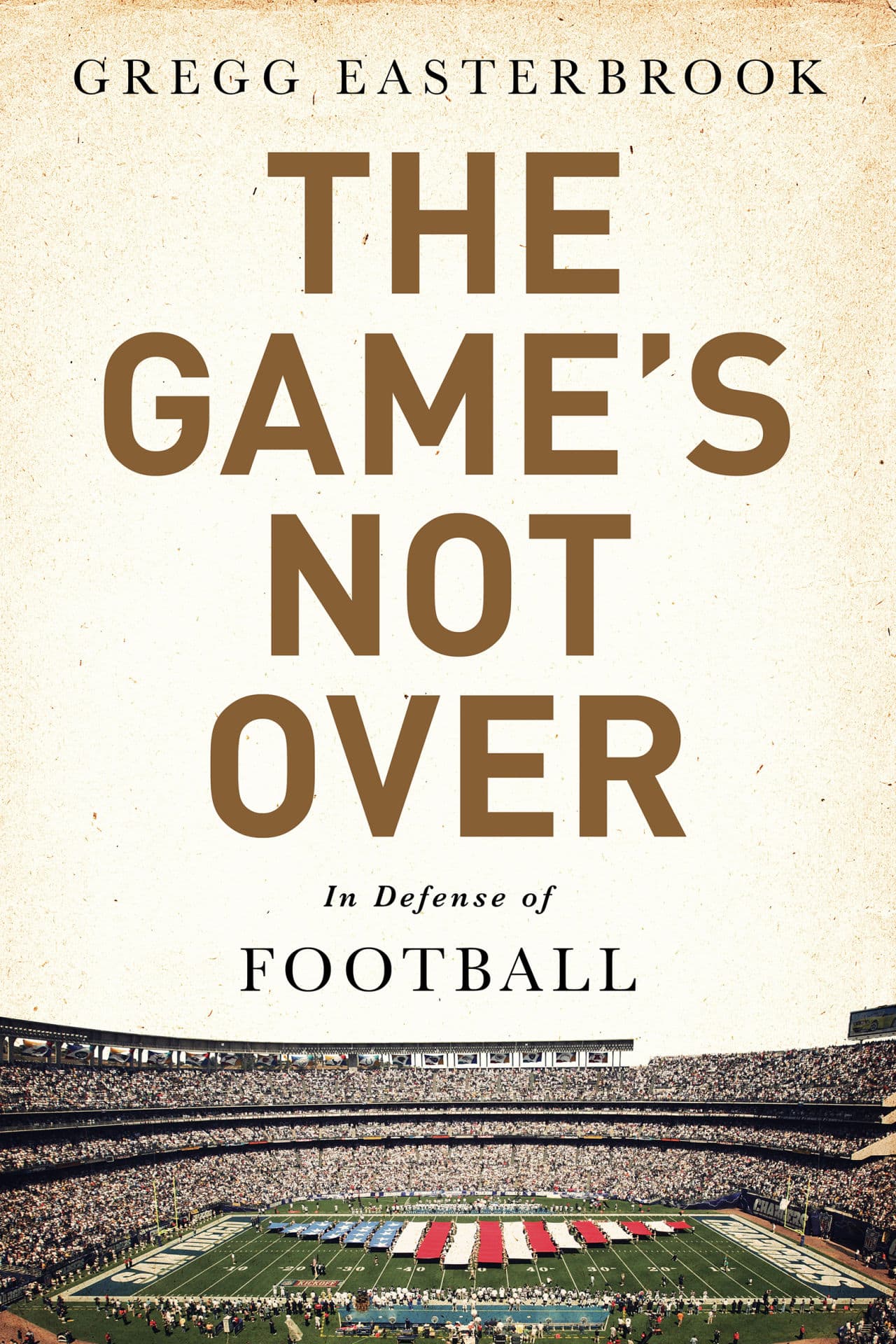Advertisement
'The Game's Not Over' Seeks Middle Ground In Football Debate
Resume
Let's consider the proposition that, “the march of the NFL into our homes has made professional football inseparable from the country’s perception of itself.” That’s a big idea, and, it seems to me, kind of a generalization, but, is “the country’s perception of itself” so singular that we can characterize it that way?
The Atlantic Monthly's Gregg Easterbrook thinks so. His most recent book is "The Game's Not Over: In Defense of Football" and he joined Bill Littlefield.
Highlights From Bill's Conversation With Gregg Easterbrook
BL: The book presents a defense of the NFL. What inclined you to think that the NFL needed defending?
Football is the American national sport because it's what America is: too complicated, too expensive, too loud, too aggressive, and you can't take your eyes off it.
Gregg Easterbrook
GE: Well, we live in a polarized country. The standard analysis is that you're either for something or against it. Most of the commentary that we've seen about football in recent years, especially since the head injury concern — which is a very important concern — arose, was some saying, "The game is fine, leave it alone," and others saying, "The game is terrible. It should be outlawed." The middle position of, "The game is great, but it needs to be reformed," has not been well enunciated. So, that was my goal in the current book.
BL: In fact, the subtitle of the book is a little bit misleading, I think. You don’t defend tackle football as played by children. Why not?
GE: The NFL is played by grown men who knowingly assume a risk in return for great reward. At the youth level, especially, there's only risk. Pediatric studies are increasingly showing that the immature brain and neck that aren't finished forming yet are much more vulnerable to neurological risk than a grown man's brain and neck are. We have probably as many as 2 million boys and a few girls playing tackle football in full pads, and it's crazy. You can be against that and want that to end and still think that the NFL is basically great and that college football is good as it's played but needs reform so it doesn't detract from education.
BL: But given what we’ve learned over the last few years about brain injury in football, aren’t there several thousand former NFL players who would argue with you about those life-and-death consequences?
 GE: Well, Centers for Disease Control has studied retired NFL players and found that, as a group, they live longer. They have fewer heart attacks, fewer strokes and they are less likely to commit suicide than men of the same birth year. Now, we know of a few spectacular and awful tragic exceptions to that rule, but, as a group, retired NFL players in later life are in pretty good shape. One reason I make the distinction that I make about youth football is health studies, including some done at Boston University in your backyard, show that retired NFL players who began playing tackle football in pads before the age 12 are the ones that show long-term neurological decline. The ones who didn't start to play until they were in middle school show no more neurological decline than other men of the same birth year.
GE: Well, Centers for Disease Control has studied retired NFL players and found that, as a group, they live longer. They have fewer heart attacks, fewer strokes and they are less likely to commit suicide than men of the same birth year. Now, we know of a few spectacular and awful tragic exceptions to that rule, but, as a group, retired NFL players in later life are in pretty good shape. One reason I make the distinction that I make about youth football is health studies, including some done at Boston University in your backyard, show that retired NFL players who began playing tackle football in pads before the age 12 are the ones that show long-term neurological decline. The ones who didn't start to play until they were in middle school show no more neurological decline than other men of the same birth year.BL: There are aspects of the NFL that you criticize in the book. You describe NFL Commissioner Roger Goodell as a latter-day-viceroy — which I thought was particularly good — you deplore the way billionaire owners are subsidized by taxpayers, including, of course, taxpayers who have no interest at all in football. How would you go about reforming that aspect of the NFL?
GE: Well, the estimate I use is about a billion dollars a year for stadiums goes from taxpayers to the billionaire ownership class of the NFL. I consider that an outrage. The ideal solution would be for politicians to develop some spine and stop making giveaways to NFL owners. But the world may end before politicians develop some spine. So, the very practical solution to this is for Congress to change copyright laws so that events that are conducted in publicly funded facilities cannot be copyrighted. And if that were to happen, the NFL, on the day that law passed, would repay all subsidies that it had ever received and never ask for another subsidy again because the ability to copyright its images is the essence of its revenue.
GE: We see in its craziness and noise and expense and elaborateness things that we care about in our own society. The reason the Ray Rice video became such a sensation, him punching his then-fiancée, is because we knew it was the reflection of the domestic violence problem that America wasn't facing. Football is the American national sport because it's what America is: too complicated, too expensive, too loud, too aggressive, and you can't take your eyes off it.
Bill's Thoughts On 'The Game's Not Over'
In his most recent book, Gregg Easterbrook maintains that the NFL “holds up a mirror to American society.”
Who can argue that? The game is violent. The U.S. leads the international league in gunplay, not to mention drone strikes.
[sidebar title="An Excerpt From 'The Game's Not Over'" width="630" align="right"]Read an excerpt from "The Game's Not Over: In Defense of Football" by Gregg Easterbrook.[/sidebar]
Beyond the delights of narcissism, Easterbrook explains the extraordinary popularity of the NFL by contending that “the quality of play has never been higher.” He also suggests that whereas “in international affairs, economics, and race relations, terrible things occur…in the NFL, only entertainment occurs.”
Chronic traumatic encephalopathy also occurs, as does the neglect of former players suffering from all manner of physical, psychological, and financial problems related to their previous employment, but for Easterbrook these concerns are secondary to the NFL’s ability to “bring people together… which matters in an increasingly polarized, fractious society.”
It’s only fair to acknowledge that Easterbrook’s celebration of the NFL as boon to fellowship and peace is tempered somewhat by his displeasure at the extent to which the league’s owners are subsidized by taxpayers. He also recognizes that the league got off very cheaply in the settlement of the former players’ lawsuit that maintained that the NFL had withheld knowledge of the harm the players were doing their brains and, by extension, their futures. Nor is that the author’s only complaint about football as it’s practiced in the U.S. today. Like lots of neurologists, he’d like to see small children playing flag football rather than risking their still-developing brains and bodies by crashing into each other.
But his criticisms notwithstanding, Easterbrook’s take on today’s NFL will be welcome reading to football fans who’ve been feeling guilty about tuning in each Sunday…and Monday…and sometimes during the week.
This segment aired on February 6, 2016.
